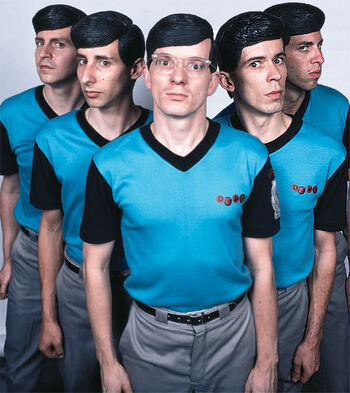Devo Now, More than Ever

On February 15th, Devo’s Facebook page began soliciting collective input for what they should play at on February 22nd at the Winter Olympics at Whistler. As such, “Devo Communications” musical concert will serve notice that it is vying for a return to mass relevance. And this time, according to the band, Devo enters into a new era where “de-evolution is real and Devo is normal”. Which is why Devo’s inclusion at the Olympics is simply an inspired choice for important times. Given the American tendency to avoid irony at all costs for anything “National”, Devo’s selection is yet another reason to look to the Great White North for inspired ideas. Lord knows we could use a few of those. After 2009, a year where millions of foreclosures and hundreds of billions spent on bailouts and lies about health insurance reform have both flattened the middle class along with much of the Hope from November 2008, Devo has returned with a message: De-Evolution is a prophecy fulfilled.

Formed in the wake of the 1970 Ohio National Guard shooting and killing of four students who were protesting the Vietnam War at Kent State, Akron, Ohio’s Devo has long held the perspective that humankind has regressed. Their most damning evidence has been that the corporate groupthink that has dominated US style management and has been the target of most of Devo’s artistic barbs has metastasized over the last thirty plus years to too much of the globe with disastrous effects (see global recession, a particular two-term US President with a MBA who managed the country into the ground, Windows Vista, etc.). Devo’s latest solution to the problem of corporate idiocracy: join em. Later this year Devo and Warner Brothers will release their first LP in 20 years, their first no major label since 1984. Twenty six years later, Devo’s energy domes have been recharged as they ride the crest of a fairly successful return to action. Last year’s national tour took Devo across the US as they played back-to-back nights where, in select cities, they performed the entirety of their two most popular albums, Q: Are We Not Men? A: We Are Devo and Freedom of Choice one night at a time to sold out clubs and theaters. The Devo renaissance is in full force.

For me this comes not a minute too soon. A year removed from the eight-year horror story which was the beginning of this decade, the party responsible for this frightfest has never (and probably will never) admitted any guilt for driving the US into the worst set of crises in my lifetime. Worse yet, the new party in power has wasted a year trying to forge a politically-impossible middle with a group of ideologues who don’t believe in science and have contempt for any kind of rational governance. Given this equation, I don’t know which party is dumber. However, I do know that in 2010 it feels like de-evolution is now a fact of life. As Devo puts it, it is “a prophecy fulfilled”. And Devo’s new image fits the times perfectly: a corporate, focus-grouped driven set of artists that will happily produce collective art ala capitalism. In a recent interview with Billboard, Devo’s leader, Mark Mothersbaugh, the magazine noted that “the band is taking a consciously ironic ultra-corporate approach to the release, including focus-grouping every aspect of the album’s marketing.” The stupidity of “focus testing the future” is promoted in their most recent YouTube missive and Devo’s latest flash-based send up of online testing, The Devo Color Study. That latter example asks questions such as “Which color for the car makes you dislike the man more?” and “What color ink is this man writing his ransom note in?” in a voice that can only be described in an absurd computer/euro accent. You can’t help but finish the survey, receive your “Devo Color” (mine was red) and you are asked to share it on your social network of choice. It’s both a joke, an art project and and a business strategy. It’s something Warhol would applaud. It may even show up in Devocom’s bottom line. Whatever it is, Devo appears to be moving themselves and their audience someplace new. As band member and co-leader Gerard Casale puts it, “We feel like all our dire predictions have come true.” Casale continues, “Now, that it’s real, it’s time to move on.” In other words, Devo has re-engaged our culture once again right at the time when we need them most. Duty now for the future, indeed.



This is great (and “…Windows Vista…”, that’s inspired! 😉
This seems to be a theme with a lot of recent aesthetic production. From the 60’s to the 80’s the mantra of counterculture music, media, and even academic production was ‘overt critique’. Devo was of course the most subversive and clever major label band with wide distribution. More recently patterns of ‘critique’ seem to have shifted into the realm of ‘parody’ by way of emulation. In other words, a lot of good (and bad) creative work gets its message across by simply reproducing taken-for-granted tropes and aesthetic embodiments, assuming that a performance conducted with ‘snark’ suffices to expose inherent contradictions. Devo I trust to reveal layers of irony. Other times, though, I worry that this trend unwittingly celebrates and reinforce dominant commercial culture, quashing possibilities for transformative aesthetic experience. I wonder if, as you allude to in your post, this is exactly why Devo are taking this route with their new material? It’s a critique of corporate culture, but perhaps also a critique of the current state of ‘Family Guy-esque’ matter-of-fact subtextual performance?
I have thought a lot about your comment and I guess one of the issues that Devo has always dealt with is not simply how to subvert anything, but what it means to be critical. In the pre-punk 1970s the rock-led counter culture offered plenty critique but slowly mutated into an easily coopted movement of singer-songwriters and progressive rock. Devo simply rejected this path. For Devo there was no hope in the counter culture. In fact, since they held out a firm belief in regression, the question was how to move forward into sets of new traditions that had very little to do with a counter culture that somehow embraced a variety of agrarian styles and traditions (see “folk music” and “communes”). Indeed, Devo let the way in the popularization of synthesizers and were among the first bands to be explicit about their sale of merch. I still have a vinyl copy of “Oh No, It’s Devo” and the record sleeve has an order form where you can buy energy domes and suits. In this sense they aren’t winking and nodding. They never have been and that is something that many people don’t understand. It feels “jokey” but the truth is Devo finds no hope in countering capitalism.
For example, many musicians and people like myself see this as a specific period in history where musicians have a chance to develop a “middle class” life through independent entrepreneurialism. No doubt, Devo, with their brand, understanding of technology and devotion to merch, could do this. However, they have elected to go with a major. Given that all majors these days are offering 360 deals, this means Devo has most likely decided to give up some merch income in return for the support of a transnational media conglomerate. This is both perplexing and exciting. Do they really want to return to global dominance? I honestly don’t know. Yet it is something to think about as they release their new record and consider as they mock and celebrate corporate practices such as focus groups. Sure, there is irony. But it is irony that may be cloaking a particular brand of “positive nihilism” that celebrates not the progress of humanity but the progress of mutations.
‘Their firm belief in regression’–nicely stated. That does seem to be one of their major themes, further complicated (as you point out) by their being a major label band. If Devo believes consumerism has culminated to the point that we’ve counter-plateaued, it does make some sense that a performance of embodied ‘positive nihilism’ would represent the next step in deevolution. This speaks to my concern that our recent cultural move to ’embodiment parody’ is just a reactionary practice. But I still wonder if there’s something to Devo 2.0 that intends to lampoon irresponsible comedic performance, which in light of a general lack of critical movements in popular music or mainstream culture would make their (expectedly contradictory) return even more prescient.
I couldn’t agree more, both with Devo and you assessment of their continuing relevance. Their first album was marketed under the tagline:
“The Important Sound of Things Falling Apart.” I can’t think of a better motto for the new American century.
Between me and my husband we’ve owned more MP3 players over the years than I can count, including Sansas, iRivers, iPods (classic & touch), the Ibiza Rhapsody, etc. But, the last few years I’ve settled down to one line of players. Why? Because I was happy to discover how well-designed and fun to use the underappreciated (and widely mocked) Zunes are.